Cambridge iGEM2012 team is finalist at the European Jamboree
07/10/12 09:30
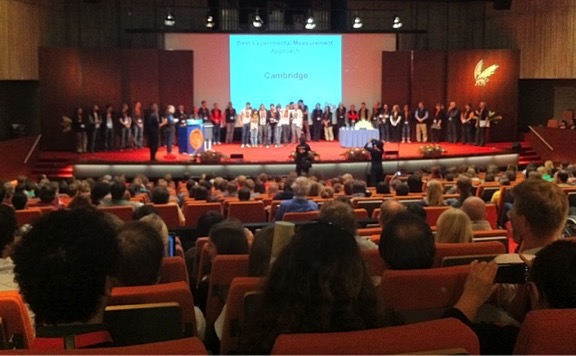
The Cambridge iGEM2012 Team presented their “Sporduino” project at the European iGEM Jamboree in Amsterdam, Oct 6-7th. The Sporduino project is a combination of open source biological tools, Arduino based instrumentation and Android phone based software - to provide a free platform for field use of standardised biosensors. The team members were: Andreas Petirdes, Charlotte Bransfield-Garth, Emmy Tsang, Jolyon Martin, Oliver Meacock, Paul Mallaband, Stuart Bell and Tom Whittaker. For more information, please see: http://2012.igem.org/Team:Cambridge/Team.
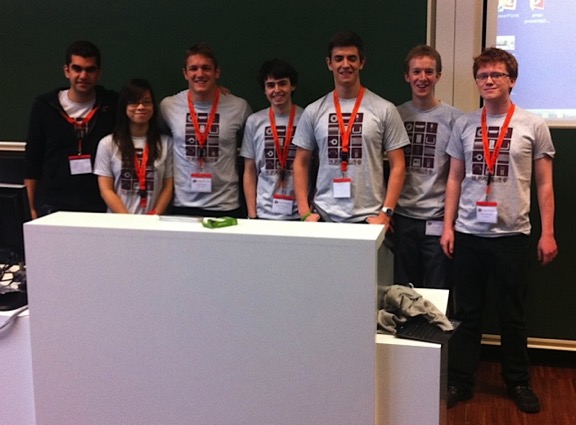
Google Hangout for UK iGEM teams
17/08/12 11:30
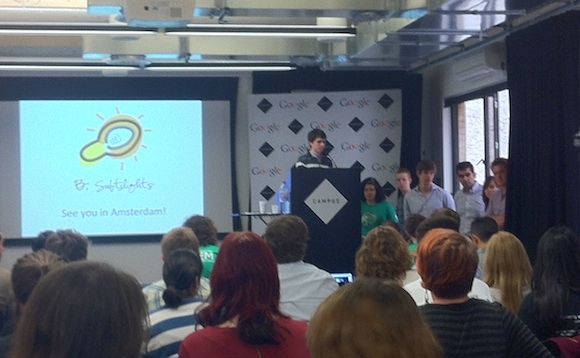
Google Hangout with UK iGEM Synthetic Biology Teams at Google Campus London. The Cambridge iGEM2012 team joined 8 other teams at Google Campus for a day of presentations, posters and chatting. For more information, here’s the link.
Wellcome Image Awards
26/06/12 23:49
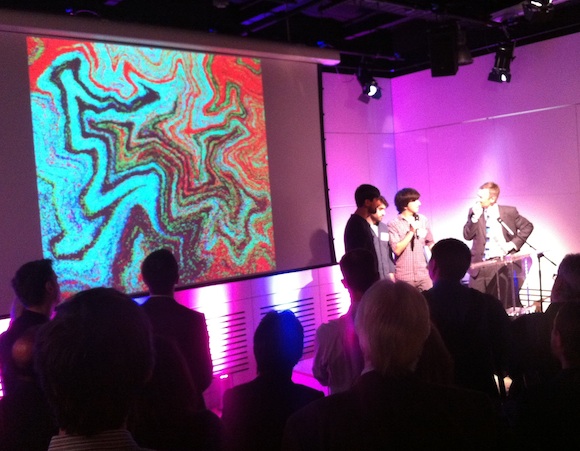
Fernan Federici, in collaboration with Tim Rudge and PJ Steiner, continued his winning streak in scientific imaging competitions. The three shared two awards at the annual Wellcome Trust Imaging Award ceremony at the Wellcome Trust headquarters in London. The gallery of winning images can be found at: http://www.wellcomeimageawards.org/index.htm
Cambridge iGEM2011 and the BBC Horizon programme
17/02/12 07:03
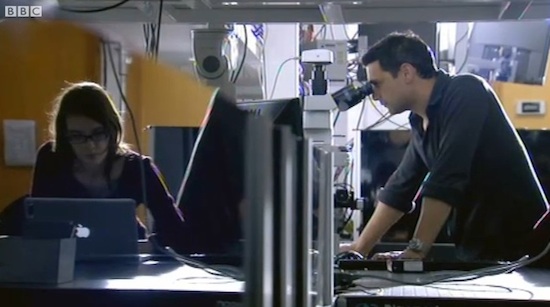
Adam Rutherford meets the Cambridge iGEM2011 team, and Cat McMurran describes the use of squid reflectins as a biological source of iridescence. The iGEM team built reflectin biobricks for expression of the protein and production of iridescent films that response dynamically to changes in hydration. A video clip of the interview can be found here at the BBC website. The full programme was first broadcast on Feb 17th at 9:30pm on BBC2, and can be played back on the BBC iPlayer. More information about the iGEM competition at the University of Cambridge can be found at: http://www.synbio.org.uk/cambridge/cambridge-igem-teams.html
Cambridge-Santiago SynBio
14/01/12 23:54
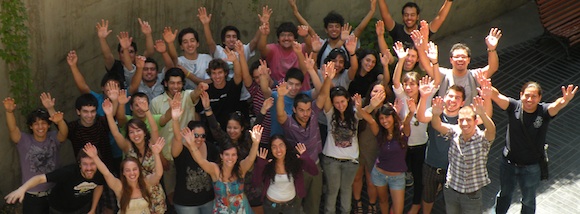
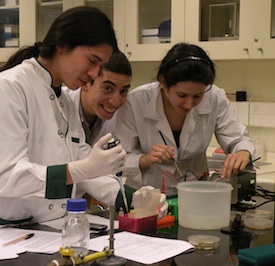
Wellcome Image of the Month
14/01/12 15:35
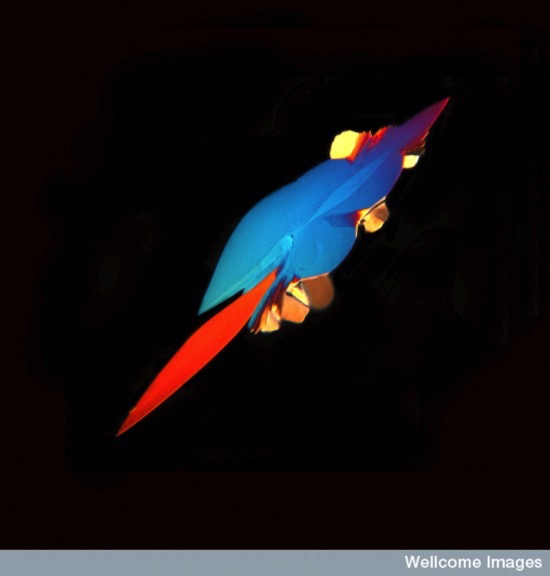
In the lab, Fernan Fedrici and Marcia Sartor have dehydrated drops of Malbec wine from their home province of Mendoza, Argentina, before using polarizing light microscopy to capture this striking image, which has been selected as Image of the Month at the Wellcome Trust Image Collection. Fernan comes from a family of wine growers, and he and Marcia have been exploring connections between everyday materials and science, using advanced imaging and visualising techniques. For his day job, Fernan is building new systems for engineering morphogenesis in plants in the Haseloff lab. Marcia is an artist, and more of her work can be seen here, and more of Fernan’s images can be seen here.
MoMA E. chromi exhibit
01/07/11 23:35
Talk to Me is an exhibition on the communication between people and objects that will open at The Museum of Modern Art, New York on July 24th 2011. It will feature a wide range of objects from all over the world, from interfaces and products to diagrams, visualizations, perhaps even vehicles and furniture, by bona-fide designers, students, scientists, all designed in the past few years or currently under development. The exhibition includes a display of E. chromi - a collaboration between Daisy Ginsberg and James King, and the University of Cambridge iGEM2009 team.

Marie-Virgnie Berbet | Little Black Box_Empathy Box Rizwan Bashirullah, Hong Yu, Chris Batich and Neil Euliano | Swallow-signalling Pill Fraunhofer IZM | Biotech Sensor Technology Airstrip Technologies | AirStrip OB James King and Daisy Ginsberg | E. chromi Sascha Nordmeyer | Communication Prosthesis Jonas Loh | Amæ Apparatus Gerard Rallo | Reiterative Communication Aid Gerard Rallo | Personal Adviser for Reintegration Gerard Rallo | Conversation Challenger Gerard Rallo | Expressions Dispatcher Gunnar Green | Call Me, Choke Me Kawamura Ganjavian | Earshell Adi Marom | Short++ FAT, Graffiti Research Labs, and OpenFrameworks | The Eyewriter Intiative Hans Hemmert | Level Tentacles Development Team | Tentacles

Marie-Virgnie Berbet | Little Black Box_Empathy Box Rizwan Bashirullah, Hong Yu, Chris Batich and Neil Euliano | Swallow-signalling Pill Fraunhofer IZM | Biotech Sensor Technology Airstrip Technologies | AirStrip OB James King and Daisy Ginsberg | E. chromi Sascha Nordmeyer | Communication Prosthesis Jonas Loh | Amæ Apparatus Gerard Rallo | Reiterative Communication Aid Gerard Rallo | Personal Adviser for Reintegration Gerard Rallo | Conversation Challenger Gerard Rallo | Expressions Dispatcher Gunnar Green | Call Me, Choke Me Kawamura Ganjavian | Earshell Adi Marom | Short++ FAT, Graffiti Research Labs, and OpenFrameworks | The Eyewriter Intiative Hans Hemmert | Level Tentacles Development Team | Tentacles
Nomination for INDEX:Design to Improve Life
10/06/11 00:24
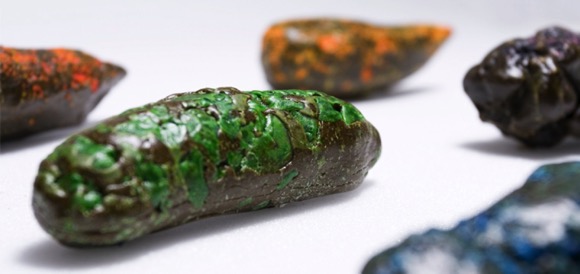
INDEX: is a Danish-based, non-profit organization that was established in 2002 and coined the concept “Design to Improve Life”. They work globally to promote and apply both design and design processes that have the capacity to improve the lives of people worldwide. INDEX: is widely recognized for the global biennial design award, the INDEX:Award, which is the largest monetary design prize in the world, worth €500,000 and encompassing the five categories of INDEX:: Body, Home, Work, Play, and Community.
The E. chromi project has been nominated for an award in the Body category in this prestigious competition.
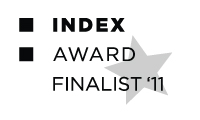
E. chromi
Body category
An inexpensive personalized disease monitor
Synthetic biology is a new approach to genetic engineering that could lead to new medical technologies, energy sources and foods. A team of young synthetic biologists studying at Cambridge University spent the summer of 2009 creating E. chromi — a set of DNA parts, or BioBricks, that can be inserted into E. coli bacteria. Each BioBrick contains genes selected from existing organisms, enabling the bacteria to produce a color: Red, yellow, green, blue, brown or violet. By combining these with other BioBricks, the bacteria can be programmed to do useful things.
E. chromi wins prize for video
28/05/11 23:52

130 films from 25 countries were submitted to the Bio:Fiction synthetic biology film festival in Vienna. In a first selection phase those entries were selected that fit the topic of the festival and fulfilled minimal technical requirements. Finally, 52 films were shortlisted and judged by an international jury that selected winners in 4 award categories. The E. chromi video won the prize for best documentary film. (see video here: http://bio-fiction.com/videos/?p=73)
Synthetic Biology at the BioCentre
20/04/11 14:35
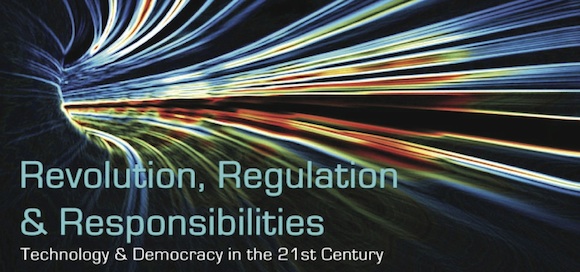
A symposium on Synthetic Biology was the third in a series BioCentre is hosting during 2010-11 entitled "Revolution, Regulation and Responsibilities: Technology and democracy in the 21st Century". The first symposium sought to introduce the theme and overall context for the series with the second focusing on the specific area of advances in nanotechnology. Both events were held in the House of Lords, Westminster with speakers including Andrew Miller MP, Chair of the Commons Select Committee on Science and Technology, Dr. Steven Hill, Head of Strategy, Research Councils UK, Dr. Peter Hatto, chair of the International Organization for Standardization (ISO) Technical Committee for Nanotechnologies and Trevor Maynard Deputy Head of Exposure Management at Lloyd’s of London. The third symposium on synthetic biology explored the general ethical, legal and social implications of this new emerging field and also looked at issues concerning security and what has been termed the “bioterror and bioerror” implications. Speakers were: Dr. Jim Haseloff, Dr. Catherine Rhodes, Institute for Science, Ethics and Innovation, University of Manchester, Melanie Duffield, Team Leader - Advanced DNA and Protein Technologies, Defence Science & Technology Laboratory (an agency of the UK Ministry of Defence) and Alexandra Daisy Ginsbery, artist/designer involved in the ethical, social and cultural implications of synthetic biology.
BioCentre is a UK think tank based in Westminster focusing on emerging technologies and their ethical, social and political implications. Established in 1984 in response to public concern over fresh challenges to ethics and policy resulting from emerging technologies, BioCentre was one of the earlier centres active in the world of bioethics and biopolicy. Its first public event was a major conference convened to address the Warnock report (which became the basis for UK policy on in vitro fertilisation and embryo research) shortly after its publication. BioCentre has published various reports and books, developed partnerships, networked various academics, policy makers and political leaders as well as hosted various conferences and symposia.